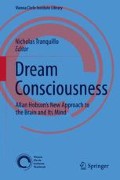Abstract
We are living in an era when communication has never been easier. In the small world of the academy, we contact many more people every single day than any scholar of the pre-industrial era could have met in his entire life. The result, however, is that contacts tend to be reduced to electronic messages or, when time is generous, to video conferences on our laptops. Sadly, however, our correspondence is rarely guided by that sacred principle of chance which generates serendipity, one of the fundamental ingredients of science.
Access this chapter
Tax calculation will be finalised at checkout
Purchases are for personal use only
References
Chomsky, N. (1956). Three models for the description of grammar. I.R.E. Transaction on Information Theory, 2, 113–124.
Chomsky, N. (2013). Problems of projections. Lingua, 130, 33–49.
Hobson, J. A. (2002). Dreaming. A very short introduction. Oxford: Oxford University Press.
Hobson, J. A., Sangsanguan, S., Arantes, H., & Kahn, D. (2011). Dream logic: The inferential reasoning paradigm. Dreaming, 21(1), 1–15.
Kandel, E., Schwartz, J., Jessell, T., Siegelbaum, S., & Hudspeth, A. (2013). Principles of neural science. New York: McGrawHill Medical.
Moro, A. (2008). The boundaries of Babel. The brain and the mystery of impossible languages. Cambridge, MA: MIT Press.
Odifreddi, P. (1989). Classical recursion theory. Amsterdam: Elsevier.
Author information
Authors and Affiliations
Corresponding author
Editor information
Editors and Affiliations
Rights and permissions
Copyright information
© 2014 Springer International Publishing Switzerland
About this chapter
Cite this chapter
Moro, A. (2014). How Does the Dream Consciousness/Protoconsciousness Concept Resonate with Linguistic Ideas and the Hypothesis of a Universal Grammar?. In: Tranquillo, N. (eds) Dream Consciousness. Vienna Circle Institute Library, vol 3. Springer, Cham. https://doi.org/10.1007/978-3-319-07296-8_23
Download citation
DOI: https://doi.org/10.1007/978-3-319-07296-8_23
Published:
Publisher Name: Springer, Cham
Print ISBN: 978-3-319-07295-1
Online ISBN: 978-3-319-07296-8
eBook Packages: Biomedical and Life SciencesBiomedical and Life Sciences (R0)

